Intro to the Big Bang and Infinity Concepts
This article is part of our student writer series. The writer Arman777, is an undergraduate physics student at METU
In the cosmology section of the Physics Forums, I encounter many big bang and related infinity problems. Hence, in this article, I want to explain the Big Bang, the topology of the Universe, and the concepts of singularities and infinities.
First, let’s start with the concept of the observable universe and what we mean by that. The observable universe is the part of the Universe which we can currently see (observe). The observable universe has a finite size and the current radius of the observable universe is approximately 46.6 billion light-years.
As we know, signals that come from distant objects travel at the speed of light. Hence, there’s a limit to what we can see. Since these signals come from all directions, the observable universe can be thought of as a sphere centered on us. (In this sense “center” doesn’t mean that we are at the center of the Universe. The universe and observable universe are different concepts).
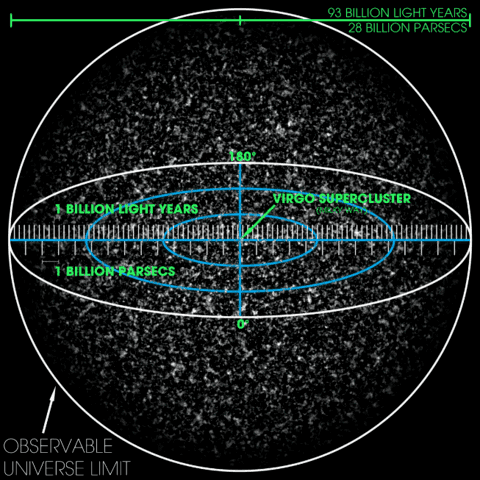
Fig. 1: The observable universe centered on us [1].
The critical point in this concept is that the observable universe would be different for different observers. For example, “the observable universe” for an observer in the Andromeda galaxy would be different than ours.
In this sense, the Universe will mean the Observable Universe plus everything outside of the Observable Universe.
Table of Contents
About the Infinities
As we may expect, the Universe can have two possible sizes depending on its geometry; It can be infinite or finite.
I. Finite Size Universe
In this case, the Universe can have a spherical, toroidal (torus), or another type of spatial geometry. But there is a very important thing that we should be careful about when we try to imagine such spatial geometry. We usually think a sphere embedded in a space, and we were looking it from the outside and we say “well, that’s the Universe”. This kind of approach is wrong. Since there’s no such thing as an “outside of the Universe”. We can’t imagine the Universe from the outside point of view because as I said before, the Universe encloses everything and anything that’s possible.
In three dimensions, imagining such topology can be challenging hence, the two-dimensional analogy can be used to describe the situation.
An easier way to imagine the concept of the finite universe is, thinking of ourselves as a 2D creature on a two-dimensional positively curved universe (surface of a sphere). Since we are 2D creatures, we could move only in 2 general directions; forward-backward and right-left. On the surface of a sphere that is expanding in the same manner as our universe, if we started at a fixed point in co-moving coordinates and traveled at some faster than light speed in any direction along a great circle of the sphere, we could eventually find ourselves back at the point where we started. The idea of finding ourselves in the same place is the main concept of the finite universe. There wouldn’t be any edge for us and we can go on forever and we may find ourselves in the same spot repeatedly.
II. Infinite Size Universe
In this case, the Universe can have a hyperbolic or flat spatial geometry where the universe goes on forever. Unlike a finite universe, we can go on forever and never come back around to a location we’ve already been.
About the Big Bang
Now let’s consider the Big Bang. In this article, I’ll specifically talk about the Big Bang singularity. People that try to explain the Big Bang singularity often say that the universe started from a point and then it evolved. But this description is not reflecting the truth. Big Bang singularity cannot be treated as a “point type explosion”. The problem arises when we think of singularity as a “point in space-time”. But why do we say it didn’t start from a point but still say it started from a singularity? What is the main difference?
According to Einstein’s general theory of relativity, spacetime at every event has definite curvature. If that curvature is everywhere infinite, we define no spacetime at all. If we try to imagine the time of the big bang itself as being covered by cosmology, we are saying that there is a time at which spacetime is not properly defined. So, there can be no time in the cosmology corresponding to the big bang. We describe the big bang as a “singularity”, a breakdown in the laws that govern space and time.
The term singularity, roughly speaking, designates a point in a mathematical structure where a quantity fails to be well defined, even though the quantity is well defined at all neighboring points. The simplest and best-known example arises with the inverse function, ##\frac {1} {x}##. As long as ##x## is non-zero, ##\frac {1} {x}## is well defined.
But as we approach to zero we started to get different infinities
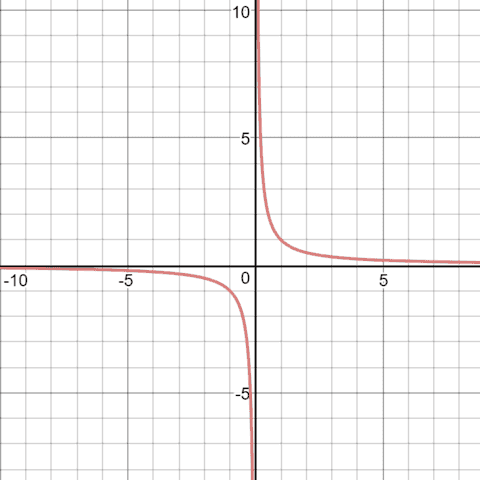
Fig. 2: The graph of ##\frac {1} {x}##
To find the ##\lim_{x \rightarrow 0} {\frac {1} {x}}## we can write,
##\lim_{x \rightarrow 0^-} {\frac {1} {x}}=-∞##
##\lim_{x \rightarrow 0^+} {\frac {1} {x}}=+∞##
As we all know, in arithmetic classes we say that ##\frac {1} {0}## gives us infinity. But that’s actually not the real case, as we can see for a negative value that closes to ##0## can give us minus-infinity and positive values that close to ##0## gives us infinity. So which value should we give for ##\frac {1} {0}##? “Plus-infinity” or “minus-infinity”? The safer course is just to say that we have a singularity at ##x=0## and not try to give it any value.
What we can say is this. The Universe has age or time, it’s age after the big bang. The space-time of the Universe exists for every age greater than zero: 1 million years, one hundred years, one second, one-half second, one-tenth second, and so on. No matter how small we make the age, there is a corresponding spacetime, as long as the age is greater than zero. But nothing in general relativity (no spacetime at all) corresponds to the zero-age (similar case of ##\frac {1} {0})##.
This moment of zero-age is a fictitious moment in the history of the Universe. In that regard, it is like the fictitious point “at infinity” on the horizon where parallel lines meet. Of course, we all know that there is no such point, although we see it drawn routinely in perspective drawings [2].
Now, let me combine these ideas to see the full picture,
In case 1, we are living in a universe that is infinite, it was infinite at the beginning of the universe (after the big bang) and it’s still infinite.
In case 2, we are living in a finite universe. At the beginning of the universe (just after the big bang), the universe was finite, and it will always be finite. This means that when you travel in a certain direction you may find yourself at the same point at which you started the journey.
In both cases, the universe is possibly finite in time and again in both cases, the universe can expand. Even if the universe is infinite.
Conclusion
In cosmology, from looking at the CMBR, we can have some ideas about the topology of the universe. In the recent Planck 2015 data, we see that the observable universe has a flat geometry (within the limit of our measurement). It normally implies an infinite size universe, but it doesn’t have to be necessarily true.
For example, think of a two-dimensional positively curved universe (to visualize the concept more easily). We could have been living in an infinitesimal portion of the surface of that sphere, so that, when we try to measure the curvature of the observable universe, we get zero. Hence, in this scenario, we can assume that the universe is infinite (since the portion of the universe that we observed, seems to be flat). But, we know that the universe is finite in size and thus our assumption was wrong.
In this sense, we cannot know the size or the topology of the universe from CMBR data. We can say that the observable universe is flat (again, only to within our ability to measure it).
We model the universe as being infinite, but we know that future measurements may show that it is actually finite.
In short, the Universe may be finite in time, also our measurements support either an infinite universe or a finite universe whose curvature is so small that we cannot measure it at this time. The Universe expanded from a singularity (not an explosion from a point in space) in an event we call the Big Bang and eventually evolved into the Universe we live in today.
Special thanks to @Drakkith and @phinds who helped me with the editing.
References
1- Observable Universe (https://en.wikipedia.org/wiki/Observable_universe)
2- Retrieved from (http://www.pitt.edu/~jdnorton/teaching/HPS_0410/chapters/big_bang_FRW_spacetimes/#What)
Further Reading
1- The Status of Cosmic Topology after Planck Data (https://arxiv.org/ftp/arxiv/papers/1601/1601.03884.pdf)
2- Planck 2015 results. XVIII. Background geometry & topology (https://arxiv.org/abs/1502.01593)
I am an undergraduate physics student at METU.

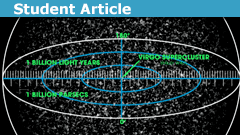


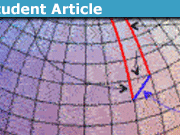
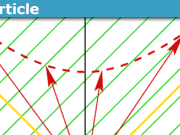


No, it is not an "interpretation" of what pop science says, it is EXACTLY what pop science says.Not in every case. I searched YouTube for "astronomy big bang theory" (the "astronomy" is there to avoid hits about the sitcom).
The top hit was , Phil Plait in his Crash Course Astronomy #42. I think he does a good job of acknowledging and addressing the "explosion" misconception about the Big Bang. From about 04:30 to 05:15 he talks about the universe starting as an "über-dense thing". He talks about when everything was in "one place" and says "when the universe was a tiny dot". Plait has sound credentials and probably a good grasp of the Big Bang Theory. He never says the universe started out as a point. I've played that video for high school astronomy students, though, who hear his words an meaning that.
The next hit was Crash Course in Big History. It describes the start as "many, many many times smaller than the nucleus of an atom".
The Beginning of Everything does not say anything about the initial size.
Into the Universe with Stephen Hawking does say rewinding time brings everything to "a single point", but also later says "smaller than an atom" and "very tiny"
The History of the World in Two Hours says "smaller than an atom".
I found the article and the discussion very helpful. There is, of course, a popular misconception that the Big Bang Theory says all matter space and time was once in a point that expanded outward. (This is probably a natural interpretation when taking what is found in pop science presentationsNo, it is not an "interpretation" of what pop science says, it is EXACTLY what pop science says.
I found the article and the discussion very helpful. There is, of course, a popular misconception that the Big Bang Theory says all matter space and time was once in a point that expanded outward. (This is probably a natural interpretation when taking what is found in pop science presentations and fitting it into the notions of space and time that we grow up with.) Clarifying that is a step toward demystifying the science, and that is valuable in the current environment of doubting the validity of scientific reasoning.
Two points:
1) There is a minor typo in the article: "as being covered by of the cosmology".
2) I recognize that in writing something like this you have an audience is mind and write to the background you presume it to have. Still, I recommend either developing the idea of "co-moving coordinates" or avoiding the term.
Hey I found some new theory about big bang check it out:https://www.physicsmindboggler.com/2018/01/big-bang.html?m=1
Continue reading the Original PF Insights Post.[/QUOTE]
It's a logical definition if you look back historically and see that the Big Bang model arose long before the idea of inflation.Well yes..you are right about that
It's understandable but kind of awkward, well thanks.It's a logical definition if you look back historically and see that the Big Bang model arose long before the idea of inflation.
No.
Yes.
What you are missing is that the thermodynamic laws are more general than the particular cases you are used to. You are used to seeing them applied to cases like a gas in a pressure vessel, where there is a clear boundary between "system" and "everything else". But that does not mean the laws are limited to those particular cases. They work for any case where you can define some kind of state space for the system and some kind of coarse graining of the state space according to thermodynamic variables. That can be done for models of the entire universe like the ones used in cosmology. There are some subtleties because of gravity/curved spacetime, but they are not insurmountable.
Wikipedia actually has a decent article on this:
https://en.wikipedia.org/wiki/Thermodynamics_of_the_universeOK, thanks for clarifying and even bigger thank for the link! I'll definitely check it out. Just to point, I was not challenging any theory that currently exists – I was merely trying to figure out what's going on and why. Once again thanks for the info and for pointing in the right direction.
if we assume the infinite universe without an "outside" then doesn't that break the thermodynamic laws?No.
Or am I perhaps missing something critical?Yes.
What you are missing is that the thermodynamic laws are more general than the particular cases you are used to. You are used to seeing them applied to cases like a gas in a pressure vessel, where there is a clear boundary between "system" and "everything else". But that does not mean the laws are limited to those particular cases. They work for any case where you can define some kind of state space for the system and some kind of coarse graining of the state space according to thermodynamic variables. That can be done for models of the entire universe like the ones used in cosmology. There are some subtleties because of gravity/curved spacetime, but they are not insurmountable.
Wikipedia actually has a decent article on this:
https://en.wikipedia.org/wiki/Thermodynamics_of_the_universe
he universe represents a system if I am not mistaken and if it is expanding then how can it do so without interaction with the surroundings? Doesn't that violate basic thermodynamic principles?There ARE NO "surroundings".
If you don't like the fact that the universe encompass everything there is, then, to quote Feynman, Go somewhere else, to another universe where the rules are simpler, philosophically more pleasing, more psychologically easy.
Great article – quite well explained. However the idea of a finite universe that envelopes everything and due to this there is no such thing as "outside" of the it bothers me somewhat. I can't quite imagine how this would work. If we take thermodynamics and imagine a perfectly insulated system that can neither gain or give both heat and work then its state will stay forever unchanged. There could be no changes in volume or even temperature. Well actually temperature changes would be possible if a combustion reaction is initiated inside, but work exchange will not be possible even under these conditions due to the rigidity of the system boundaries. So ultimately if the system is to undergo changes it is supposed to be able to exchange heat and work with its surroundings, or at least work? However if we assume the infinite universe without an "outside" then doesn't that break the thermodynamic laws? The universe represents a system if I am not mistaken and if it is expanding then how can it do so without interaction with the surroundings? Doesn't that violate basic thermodynamic principles? Or am I perhaps missing something critical? I am no physicist and I might be looking in the wrong direction, and that's why I couldn't help myself but ask.
Why the BB is always considered as an event that has actually happened ?? To me, it comes as merely the temporal limit of the theoretical spacetime in the "past" direction.You can look #7
There really are three phases in cosmology as we understand it
1) t=0 the Big Bang Singularity where we don't know WHAT was going on
2) t = one Planck Time to something like t= 10E-32 seconds — the Inflationary Period (hypothetical but likely)
3) t = the end of the Inflationary Period and onward — the time of the Big Bang TheoryI found this list quite helpful:
http://www.earlyearthcentral.com/early_universe_page.html
The Planck Era (Big Bang To 10^-43 Seconds)
The GUT Era (10^-43 To 10^-38 Seconds)
Electroweak Era (10^-38 To 10^-10 Seconds)
Inflation (10^-38 To 10^-35 Seconds)
Reheating (10^-35 to About 10^-10 Of A Second)
The Particle Era (10^-10 To 10^-3 Seconds)
Big Bang Nucleosynthesis (10^-3 Seconds to 3 Minutes)
The Nuclei Era (20 Minutes to 380 Thousand Years)
There are classes of plausible theories in which time extends infinitely far into the past. One of my favorites is
https://en.wikipedia.org/wiki/Eternal_inflationActually, eternal inflation does not extend infinitely far into the past, but only the infinite future. See work by Borde, Guth, and Vilenkin: https://arxiv.org/abs/gr-qc/0110012
initial singularityThat is only stating that before physics we know of there must have been physics we don't know.
It is not supposing a physical object which is a primary cause of everything.
Why the BB is always considered as an event that has actually happened ?? To me, it comes as merely the temporal limit of the theoretical spacetime in the "past" direction.
The BB Theory is defined as starting AFTER the Inflationary Period. I don't make the definitions, I just tell'm like they are.It's understandable but kind of awkward, well thanks.
oh wait I should have just said 2. But why exactly it's not considered as in the Big Bang theory ?The BB Theory is defined as starting AFTER the Inflationary Period. I don't make the definitions, I just tell'm like they are.
2 is not, 3 IS the Big Bang Theory. If you meant are 1 and 2 not in the BB Theory, then that is correct.oh wait I should have just said 2. But why exactly it's not considered as in the Big Bang theory ?
I made the proper changes. Hope its better now.
2 and 3 are not in the Big Bang Theory?2 is not, 3 IS the Big Bang Theory. If you meant are 1 and 2 not in the BB Theory, then that is correct.
I made the proper changes. Hope its better now.
There really are three phases in cosmology as we understand it
1) t=0 the Big Bang Singularity where we don't know WHAT was going on
2) t = one Planck Time to something like t= 10E-32 seconds — the Inflationary Period (hypothetical but likely)
3) t = the end of the Inflationary Period and onward — the time of the Big Bang Theory2 and 3 are not in the Big Bang Theory?
Well yes I see. In thise first lines I was referring to general idea but just not as a singularity. I ll make the proper changesThere really are three phases in cosmology as we understand it
1) t=0 the Big Bang Singularity where we don't know WHAT was going on
2) t = one Planck Time to something like t= 10E-32 seconds — the Inflationary Period (hypothetical but likely)
3) t = the end of the Inflationary Period and onward — the time of the Big Bang Theory
Yes, I guess it depends on what people call "THE big bang". This is also confusing from literature which, e.g., places the BB after inflation. I was referring to the initial singularity, of course.Well yes I see. In thise first lines I was referring to general idea but just not as a singularity. I ll make the proper changes
Yes, I guess it depends on what people call "THE big bang". This is also confusing from literature which, e.g., places the BB after inflation. I was referring to the initial singularity, of course.I always find it less confusing to spell that out specifically as "The Big Bang Singularity" so that there's no confusion with the BB Theory
The word ”event” has a very precise meaning in relativity. It is a point in space-time.
What is usually referred to as the standard Big Bang is actually not a priori related to the singularity. It is the expansion of the Universe from a hot dense homogeneous state. Essentially the physics we know occurred. The singularity likely only occurs if you extrapolate this to earlier times using nothing but GR.Yes, I guess it depends on what people call "THE big bang". This is also confusing from literature which, e.g., places the BB after inflation. I was referring to the initial singularity, of course.
There are classes of plausible theories in which time extends infinitely far into the past. One of my favorites is
https://en.wikipedia.org/wiki/Eternal_inflationThat's really nice, I didn't know that.
Hmm, that's a good point. But still the Big Bang model is a strong model and even we don't understand the singularity cant we say the universe is finite in time?There are classes of plausible theories in which time extends infinitely far into the past. One of my favorites is
https://en.wikipedia.org/wiki/Eternal_inflation
Hmm, that's a good point. But still the Big Bang model is a strong model and even we don't understand the singularity cant we say the universe is finite in time?No, not categorically. We don't know.
Good job.
I would also add that I believe your statement that the universe is temporally finite only applies to the Big Bang model and we KNOW that that model is incomplete because it has a singularity in the math. Since we don't know what that singularity IS, we cannot say with confidence that there was no time before it. SO … I would say "In the Big Bang model of cosmology the universe is temporally finite" rather than a categorical statement that it is.Hmm, that's a good point. But still the Big Bang model is a strong model and even we don't understand the singularity cant we say the universe is finite in time?
In other cases where the universe is infinite in time, the universe got created and destroyed repeatedly? (I remember some universe models like that). It also doesn't seem to fit our universe since it expands?
Or am I missing something ?
I thought that, the Big Bang is just not an initial singularity but also "an event" (it's really hard to explain it without using the word event) that universe emerged. Like these are bounded and cannot be separated. But yes I understand your point. Is big bang just a name for the initial singularity? But not the part of the "emerging universe"?The word ”event” has a very precise meaning in relativity. It is a point in space-time.
What is usually referred to as the standard Big Bang is actually not a priori related to the singularity. It is the expansion of the Universe from a hot dense homogeneous state. Essentially the physics we know occurred. The singularity likely only occurs if you extrapolate this to earlier times using nothing but GR.
Hi,
you say the BB can be thought of as an event, but a singularity does not belong to spacetime, the union of all events (plus metric). So that can be confusing :)I thought that, the Big Bang is just not an initial singularity but also "an event" (it's really hard to explain it without using the word event) that universe emerged. Like these are bounded and cannot be separated. But yes I understand your point. Is big bang just a name for the initial singularity? But not the part of the "emerging universe"?
Good job.
I would also add that I believe your statement that the universe is temporally finite only applies to the Big Bang model and we KNOW that that model is incomplete because it has a singularity in the math. Since we don't know what that singularity IS, we cannot say with confidence that there was no time before it. SO … I would say "In the Big Bang model of cosmology the universe is temporally finite" rather than a categorical statement that it is.
Hi,
you say the BB can be thought of as an event, but a singularity does not belong to spacetime, the union of all events (plus metric). So that can be confusing :)
In an actual finite universe, which would typically be expanding or contracting, one might have to travel faster than the speed of light in the expanding case in order for the mover to arrive at the same spacial point. It may also be useful to mention choosing the point of interest as fixed in co-moving coordinates.That's a really good point. I never thought that when I was trying to explain the concept…Thanks :)
Hi @Arman777
I like your presentation, but I feel it would be improved by mentioning the following point.
Here is a quote.
In an actual finite universe, which would typically be expanding or contracting, one might have to travel faster than the speed of light in the expanding case in order for the mover to arrive at the same spacial point. It may also be useful to mention choosing the point of interest as fixed in co-moving coordinates.
Here is a suggestion.
Regards,
Buzz